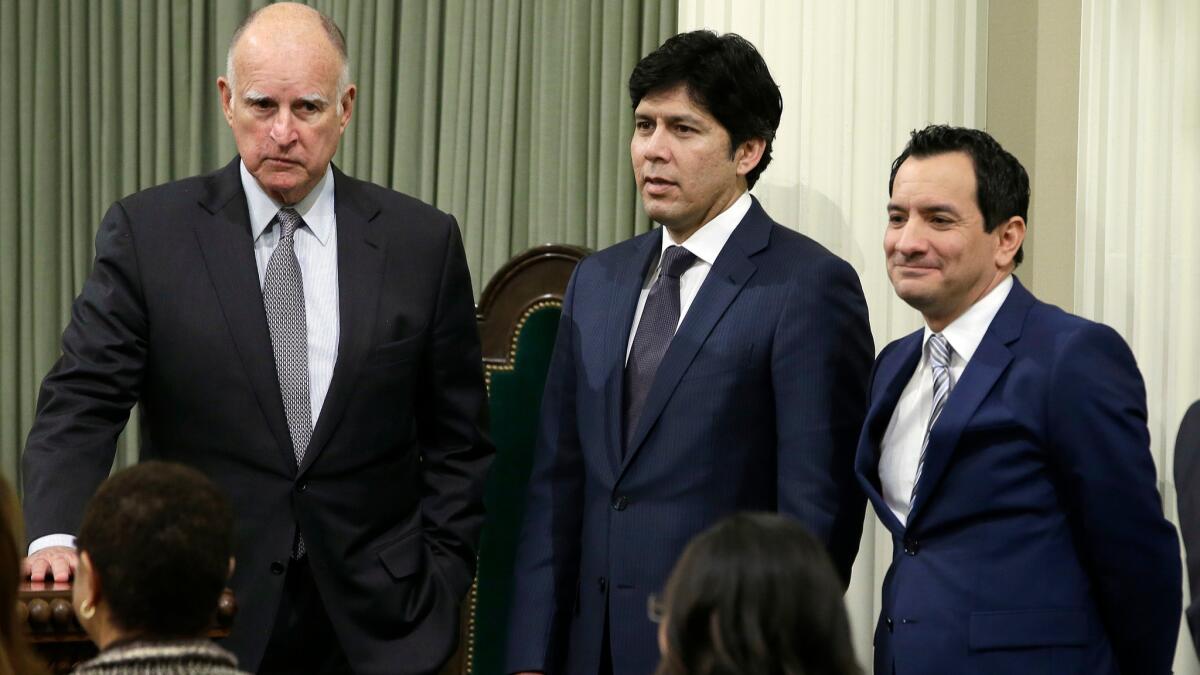Op-Ed: How Latino voters and legislators are changing California politics

- Share via
California Latinos are helping to ensure a Democratic majority in the state’s Legislature, but they are hardly a politically monolithic group. The range of their political positions creates a complicated picture of both progressive and centrist influence on state politics. As the number of Latino legislators and voters grows, they will add to the shades of blue that dominate California’s political landscape.
Latinos now constitute nearly 40% of California’s population, surpassing the white, non-Latino population. Yet they make up only 20% of the Legislature, and at the local level their numbers are even less representative of their share in the population: Statewide, Latinos make up roughly 10% of county supervisors and 15% of city council members, according to the Leadership California Institute.
Still, Latinos have achieved an unprecedented ability to influence state politics. Their legislative power is boosted by their concentration on the Democratic side of the aisle. Twenty-two out of 24 Latino legislative members are Democrats. Last year, Senate President Pro Tem Kevin de León became the first Latino to lead the Senate in over a century. And with the March appointment of Anthony Rendón, a Democrat representing California’s 63rd Assembly District, as speaker of the Assembly, Latinos of Mexican descent now lead the state’s two legislative bodies.
A majority of Latino voters are registered Democrats and only 15% are Republican, but [many] Latinos see themselves politically as “middle of the road”.
Meanwhile, the Latino Legislative Caucus has become a major driver of progressive causes in Sacramento. Thirteen of its members are chairs or vice chairs of legislative committees, and five members hold leadership appointments. Latino leadership has successfully shepherded bills that addressed educational disparities and voter access, strengthened clean energy rules and asserted immigrant rights. In June, for example, the Legislature passed Senate Bill 10, authored by Sen. Ricardo Lara (D-Bell Gardens), despite significant opposition. SB 10 is the latest in a series of bills expanding healthcare access to undocumented Californians.
At the same time, a significant number of rank-and-file Latino Democrats consider themselves moderates, and their positions sometimes drive the Legislature in a more conservative direction. These politicians reflect the wide variation in the state’s Latino electorate. A majority of Latino voters are registered Democrats and only 15% are Republican, but according to a 2016 report by the Public Policy Institute of California, 30% of Latinos see themselves politically as “middle of the road” and 36% consider themselves conservative.
And of course Latino politicians don’t only represent one ethnic group. Many must appeal to a wide range of voters to win their seats. That’s in part because among Latino citizens old enough to vote, turnout rates are much lower than for whites — the state average for Latinos was only 17% in the 2014 general election, according to the California Civic Engagement Project at UC Davis’ Center for Regional Change. In diverse districts, Latinos may make up a large share of the population but a relatively small share of voters.
In addition, when it comes to money and other forms of political influence, Latino communities typically can’t keep up with whiter and wealthier communities. Even in districts that are overwhelmingly Latino, outside money can play an outsize role and have a big effect on votes in Sacramento, sometimes to the detriment of Latino communities.
All this leads to tensions that test Democratic Party unity and provide significant pushback on some elements of the party’s agenda. For example, pro-business, moderate Latino legislators, especially those from inland districts, put a strong emphasis on protecting jobs. They are often far less “green” than the Latino leadership or non-Latino Democrats from progressive coastal districts.
In 2015, then-Assemblyman Henry Perea of Fresno, whose district has a significant oil and agriculture presence, led a group of moderate Democrats who joined with Republicans against two bills seen as the cornerstone of Gov. Jerry Brown’s climate goals. These legislators succeeded at removing a mandated reduction of petroleum use from SB 350, which increased California’s renewable energy use to 50% by 2030. A similar coalition forced concessions this year in SB 32, which nonetheless strengthened the state’s greenhouse-gas reduction goals. It passed, but not without delays and a compromise, forced in large part by these Latino representatives.
By 2040, Latinos are projected to make up 45% of the state population and 38% of its eligible voters. Despite the California Republican Party’s recent, belated efforts to soften its stand on immigration, it seems unlikely that many Latinos will switch parties and vote Republican. The rhetoric of Donald Trump and his supporters has cemented the image of the GOP as anti-Latino and anti-immigrant in the minds of another generation.
But Latinos’ Democratic loyalty won’t erase the variations in their politics. Going forward, Latinos will exert an ever-growing influence on the state’s policy landscape and the party’s agenda. They will almost certainly extend the Democrats’ power in California, but they will moderate the party’s policies as well.
Mindy Romero is a political sociologist and the founding director of UC Davis’ California Civic Engagement Project.
Follow the Opinion section on Twitter @latimesopinion and Facebook
More to Read
A cure for the common opinion
Get thought-provoking perspectives with our weekly newsletter.
You may occasionally receive promotional content from the Los Angeles Times.









